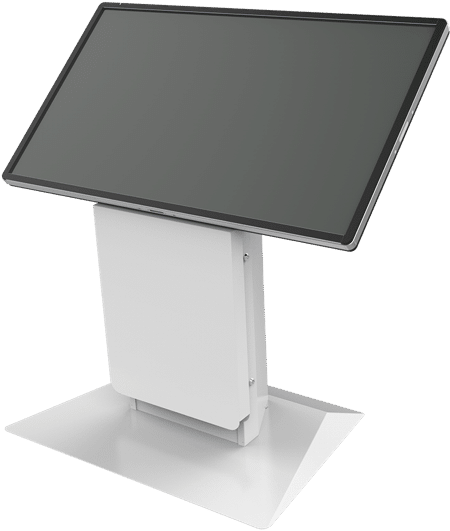The National Retail Federation’s (NRF) 2025 event reinforced a key theme: self-service technology is no longer just a convenience—it’s a necessity. Retailers are investing in self-service kiosks to streamline operations, improve guest experiences, and adapt to changing consumer expectations. As digital transformation accelerates, kiosks are evolving with new features including AI-driven intelligence, frictionless design, and omnichannel connectivity.
Here’s a look at our NRF 2025 insights that are shaping the future of retail.
AI-Powered Capabilities: Enhancing Intelligence and Interaction
Artificial intelligence popped up all over the place at NRF. And it’s making some interesting improvements to self-service kiosks. It’s making them smarter, more intuitive, and capable of delivering personalized experiences. Key advancements include:
• Advanced item recognition –AI-powered computer vision is enabling faster, more accurate checkouts, reducing the need for barcode scanning and manual input.
• Real-time speech recognition and conversational AI – Voice-enabled kiosks with natural language processing (NLP) are making self-service interactions more fluid and user-friendly.
• Personalized recommendations – AI is leveraging customer purchase history and real-time data to suggest relevant products and promotions, enhancing upselling and cross-selling opportunities.

Frictionless Customer Experience
Retailers are prioritizing user-friendly kiosk experiences that eliminate barriers and simplify transactions:
• Intuitive user interfaces – Modern kiosks are designed with touch-friendly, responsive UI elements that make navigation seamless, reducing abandonment rates.
• Multi-payment support – From traditional credit and debit cards to mobile wallets and even cash recyclers, today’s kiosks ensure frictionless transactions for all customers.
• Loyalty program integration – Customers can scan rewards cards, apply discounts, and receive personalized incentives directly through kiosks, creating a more engaging shopping experience.
Advanced Visual Technology
Kiosks are becoming more visually dynamic, incorporating high-quality displays and augmented reality (AR) to enhance the customer journey:
• High-resolution displays – Crisp, vibrant screens are improving engagement and making product information more digestible.
• Computer vision for security – AI-powered cameras can detect suspicious activity, prevent loss, and enhance self-checkout security without disrupting the customer experience.
• AR integration – Kiosks are incorporating AR to allow customers to visualize products in 3D or “try on” items virtually, bridging the gap between physical and digital retail.
Omnichannel Integration
Kiosks are now a critical part of retailers’ omnichannel strategies. Retailers are looking to kiosks to ensure a seamless interaction across digital and physical touchpoints:
• BOPIS (Buy Online, Pickup In Store) & BORIS (Buy Online, Return In Store) – Self-service kiosks are speeding up order pickups and returns, improving convenience for shoppers and reducing in-store congestion.
• Real-time inventory synchronization – Kiosks are now pulling live inventory data, preventing stock issues and allowing customers to locate products in-store or place online orders effortlessly.
Biometric Innovations
Security and personalization are advancing through biometric technology, making kiosks more secure and convenient for both consumers and retailers.

• Facial recognition – Enables personalized greetings, faster checkouts, and loyalty-based discounts by recognizing returning customers.
• Fingerprint and palm recognition – A growing number of retailers are testing biometric payments, allowing customers to check out with a simple scan.
• Age verification via mobile driver’s licenses – Digital ID scanning is streamlining age-restricted purchases while reducing manual intervention.
What to Consider
While most of the AI capabilities discussed above primarily rely on software advancements, there are still important considerations to deliver optimal performance.
For kiosks equipped with AI capabilities to deliver a positive guest experience, you also must consider that there are the challenges of variable store conditions and customer and employee behavior. For example, depending on how an individual handles an item, it might not be recognized during checkout because it’s partially obscured by a hand. It’s also likely that items will be positioned inconsistently to accurately detect and identify products. Ensuring smooth operation requires robust training data, fine-tuned sensors, and clear user guidance to minimize errors.
Similarly, voice-enabled kiosks can face hurdles with diverse accents, speech patterns, and ambient noise in busy retail environments. Retailers exploring conversational AI must invest in high-quality microphones, noise-filtering algorithms, and multilingual support to improve accuracy and user experience.
In addition, AI-driven personalization and recommendations require extensive data collection and processing. Retailers must have a clear data strategy that balances privacy concerns, regulatory compliance, and backend infrastructure—while ensuring that AI models are trained on enough relevant information to deliver useful suggestions. Even biometric authentication and AR-enhanced kiosks require well-planned implementation to address security, accessibility, and adoption challenges.
As you consider what innovations you’d like to deploy, be sure to think about these considerations as you determine which kiosk you’ll use. Retailers should conduct small-scale pilots, gather feedback, and refine their solutions based on real-world usage. The goal isn’t just to deploy cutting-edge kiosks but to ensure they function seamlessly and enhance the overall guest experience.
Next Steps
At the show, kiosks were everywhere and impossible to ignore. There were lots of self-checkout units, countertop displays, and some double-sided options. But not all kiosks are created equal and not all companies that build and sell kiosks are the same. Look for the ones that educate you about what you need to know as you embark on your kiosk journey. Work with a company that comprehends how users interact with kiosks and a company that understands the peripherals necessary to deliver the experience and outcomes you’re looking for.
The trends showcased in our NRF 2025 insights underscore how self-service kiosks are evolving to deliver smarter, more seamless retail experiences. As AI, biometrics, and omnichannel capabilities continue to advance, retailers that invest in these technologies will be better positioned to meet customer expectations, drive efficiency, and stay ahead in an increasingly competitive landscape. If you’d like to discuss your next kiosk project and the technological features and enhancements you’d like to include, schedule a call with someone on our team to help you navigate these innovations.


